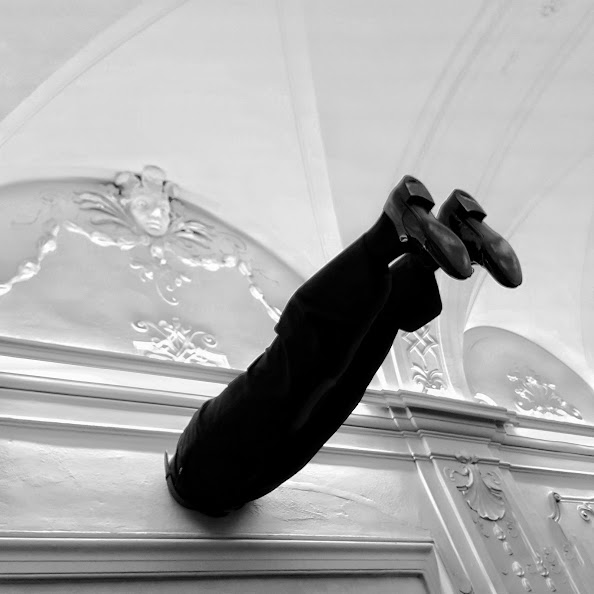Vete a tu casa Machu Picchu
 |
| “Banished/2”, (Milan, 2017) |
¡Vete a tu casa Machu Picchu! Empezó a gritar el vecino de mi suegra, a quien yo le estaba haciendo visita.
Por qué está gritando el señor, pregunté.
Porque él está medio loco, ella respondió.
Lo que no entiendo es por qué me dice Machu Picchu, si yo no
soy peruano…
Machu Picchu es el apodo de un personaje de una serie de
televisión, es un inmigrante peruano a quien su jefe discrimina permanentemente
y a quien considera alguien inferior por ser latinoamericano. El problema es
que Machu Picchu se le llama a cualquier persona procedente de Latinoamérica, es tan sólo una representación de la xenofobia
y de la aporofobia.
Me quedé pensando que no era la primera vez que me sentía
discriminado y que muchas veces había visto como las personas guardaban su
cartera cuando ya estaba cerca. Caí en cuenta de que probablemente muy pocas personas me veían como un refugiado político, como una victima colombina. Ella me dijo que seguramente la mayoría me
veía como un migrante económico; asumían que yo iba allí para
quitarles el trabajo, para que se disminuyeran los derechos pensionales de las
personas mayores y para aprovecharme de la salud pública; comentarios bastante
frecuentes escuchados en la vida cotidiana.
Era extraño porque yo nunca me había pensado inmigrante
económico sino tan sólo un refugiado político. Pero las personas no tenían por qué
conocer mi historia y entonces sus explicaciones sobre mi giraban en sus
propios imaginarios y desconocimientos.
Sentí muy insólito que en el doctorado alguien me preguntara
si en Bogotá había edificios, también me sorprendió que alguien me interrogara sobre
por qué yo nunca usaba mi traje de indígena para ir a la universidad. En una
entrevista laboral con una organización no gubernamental quien me estaba
haciendo la inducción me preguntó si yo tenía alguna experiencia de trabajo, como
sociólogo, manejando poblaciones grandes. Lo que me llamó la atención es que
era una investigación únicamente con 3000 personas aquella para la que yo
estaba aplicando; yo le respondí que había trabajado en el departamento Nacional
de estadística DANE en una investigación con 250.000 jóvenes escolarizados… Terminé
entrenando al equipo de investigación porque realmente quien tenía la mayor
experiencia era yo, el latinoamericano…
Cuando estás en un territorio que no es el tuyo, tu origen, todo parece distinto; yo, por ejemplo, en España sentía que las personas estaban permanentemente peleando conmigo, pronto
de me di cuenta de que era tan sólo una manera de hablar y que el tono de la
voz parecía no tener nada que ver con la emoción que había detrás. Nosotros
queremos invitar muy fácilmente a las personas a nuestros hogares, allí cuando alguien quiere hablar contigo te invita a una copa, a un bar. Las
únicas personas que fueron a mi apartamiento, posteriormente me informaron lo
poco frecuente que era ir a las casas de las demás personas y más aún si no
eran familiares. También aprendí que a diferencia de en nuestro país las
personas no intentan ser agradables y tampoco demostrar un interés por ti si
éste no existe. Creo que en España tuve por primera vez amigos de verdad,
verdad. Gente en la que sientes que puedes confiar plenamente. Allí nadie te
invita a un tinto si no existe un sano interés en comunicarse contigo.
Otra situación que me era difícil de comprender era la
diferencia con la que personas de los partidos políticos de derecha valoraban
el hecho de que yo fuera una víctima del conflicto armado colombiano y su
incapacidad para reconocer como algunas de las situaciones de la guerra civil
española seguían afectando las relaciones sociales, culturales y políticas.
En los largos 12 años viviendo en el exilio evidentemente fui
aprendiendo a ser parte del territorio, pero esto significó olvidar un poco la
cotidianidad del terruño en el que siempre había estado o por lo menos la
mayoría del tiempo.
Al regresar al país como “víctima retornada” empecé a hacer
conciencia de que había iniciado un nuevo exilio, que una vez más me convertía
en inmigrante y que también era muy raro aprender a vivir la vida cotidiana en
Colombia. Es bastante singular ser un migrante colombiano en Colombia.
Fotografía móvil “Desterrados/2”, (Milán, 2017). Obra de Manuel
Antonio Velandia Mora, Ganador de la Beca Idartes de apropiación de Bogotá
Diversa dirigida a los sectores sociales en la categoría víctimas del conflicto
armado colombiano.
Go home Machupichu
Go home
Machu Picchu! He started yelling at my mother-in-law's neighbor, whom I was
visiting.
Why is the
man shouting, I asked.
Because
he's half crazy, she replied.
What I don't
understand is why he calls me “Machu Picchu”, if I'm not Peruvian...
Machu Picchu is the nickname of a character from a television series, he is a Peruvian immigrant whom his boss permanently discriminates against and whom he considers inferior because he is Latin American. The problem is that Machu Picchu has become anyone from Latin America, so calling them that way is just a representation of xenophobia and aporophobia. I explain.
I was left
thinking that it was not the first time that I felt discriminated against and
that many times I had seen how people kept his wallet when he was already
close. I realized that the others probably saw me as an economic migrant and
then assumed that I was going there to take their jobs, to reduce the pension
rights of the elderly and to take advantage of public health; quite frequent
comments heard in everyday life.
It was
strange because I had never thought of myself as an economic immigrant but only
as a political refugee. But people didn't have to know my story and so their explanations
about me revolved around their own imaginations and ignorance.
I felt very
unusual that in my doctorate someone asked me if there were buildings in
Bogotá, I was also surprised that someone questioned me about why I never wore
my indigenous dress to go to university. In a job interview with a
non-governmental organization, the person who was doing my induction asked me
if I had any work experience, as a sociologist, managing large populations.
What caught my attention is that it was a research study with only 3,000 people
that I was applying for; I responded that I had worked in the National
Statistics Department DANE on research with 250,000 young people in school... I
ended up training the research team because really the one who had the most experience
was me, the Latin American...
When you
are an immigrant, everything seems different, for example in Spain I felt that
people were constantly fighting with me, I soon realized that it was just a way
of speaking and that the tone of the voice seemed to have nothing to do with
the emotion that was behind it. We want to invite people to our homes very
easily, there, for example, when someone wants to talk to you, they invite you
for a drink at a bar. The few people who went to my apartment later informed me
how infrequent it was to go to other people's houses and even more so if they
were not family members. I also learned that unlike in our country, people do
not try to be nice or show interest in you if it does not exist. I think that
in Spain I had real friends for the first time, right. People you feel you can
trust completely. Nobody invites you to a red wine there if there is no healthy
interest in communicating with you.
Another
situation that was difficult for me to understand was the difference with which
people from right-wing political parties valued the fact that I was a victim of
the Colombian armed conflict and their inability to recognize how some of the
situations of the Spanish civil war continued. affecting social, cultural, and
political relations.
In the long
12 years living in exile, I evidently learned to be part of the territory, but
this meant forgetting a little about the daily life of the land in which I had
always been, or at least most of the time.
Upon
returning to the country as a “returned victim” I began to become aware that I
had begun a new exile, that once again I was becoming an immigrant and that it
was also very strange to learn to live daily life in Colombia. It is quite
unique to be a Colombian migrant in Colombia.
Mobile
photography “Banished/2”, (Milan, 2017). Work by Manuel Antonio Velandia Mora,
Winner of the Idartes Scholarship for the appropriation of Bogotá Diverse aimed
at social sectors in the category of victims of the Colombian armed conflict.


Comentarios
Publicar un comentario